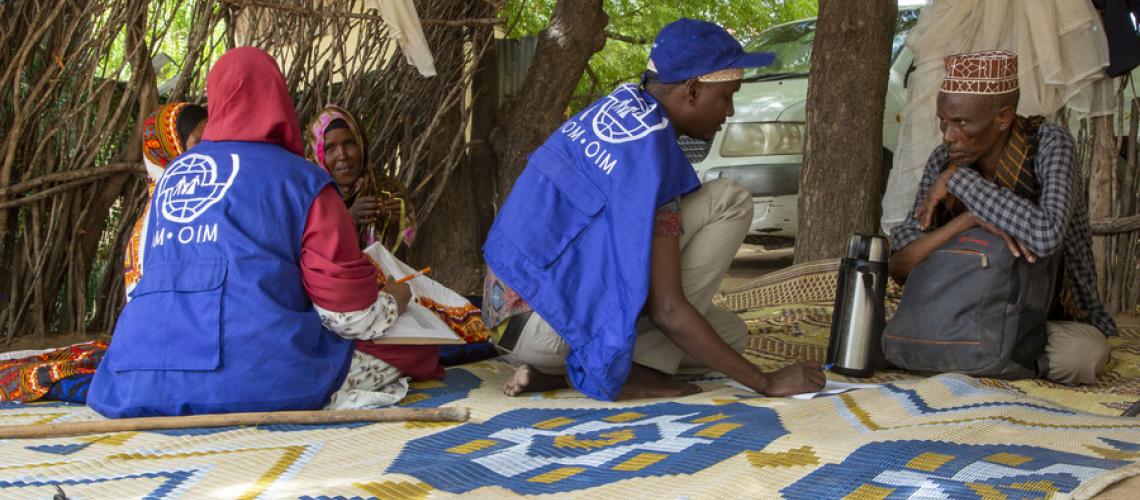
CADRI relies on a wide network of experts across the globe to provide technical support to countries to reduce disaster and climate change risks. In Southern Africa, CADRI is hosted by the International Organization for Migration (IOM) and the Food and Agriculture Organization (FAO)’s Regional Bureaux. For this issue of CADRI's bulletin, we interviewed Bogdan Danila, Senior Regional Emergency and Post-crisis Specialist at IOM and Sina Luchen, Regional Agronomist at FAO’s Regional Resilience Hub in Southern Africa to share their experience as co-hosts but also as experts who have been part of several CADRI country missions in the region.
What has been your experience being deployed on a CADRI country support mission and how do you reflect on the added value of this methodology at country level?
Bogdan Danila: I have been deployed to a couple of CADRI support missions (in Zimbabwe, Mauritius, Botswana) and being part of CADRI’s inter-agency teams has been a rewarding experience. In my opinion, CADRI's added value at country level is that it contributes to reducing disaster and climate risks through the “CADRI Country Compact” approach, and leverages partnerships at national, regional and global levels. While the CADRI Country Compact acknowledges the Government's ownership and leadership role, this is complemented by a “whole of society” approach, which includes consultations at national level as well as at international level, operationalized by deploying regional or global experts from UN agencies, as well as UNDAC members, in line with priority sectors identified by the Government.
Sina Luchen: With FAO’s support, I deployed to CADRI support missions in Zimbabwe, Namibia and Botswana. CADRI provides technical support to assist countries to take an in-depth look at their disaster risk reduction coordination mechanisms, and identify gaps and opportunities for better coordination. This process provides a sense of ownership to the Governments CADRI supports, and ultimately results in strengthened coordination among key sectors in the country. This is critical for our region as it frequently suffers from climate and other shocks. Over the past months, the COVID 19 pandemic has underlined the importance of sectoral coordination for risk reduction.
How is the CADRI regional facilitation mechanism contributing to position the work of the UN System in disaster risk reduction and climate change adaptation in your region, in the context of the Regional Inter-agency Standing Committee (RIASCO)?
Bogdan Danila: CADRI contributes to the foundation for coherent disaster risk reduction and climate change adaptation programming among the government, the UN system and other in-country national and international partners. At the same time, CADRI works in partnership towards greater inter-agency synergies, both at national and regional level, and produces a range of political and symbolic value additions in response to capacity development needs. CADRI's regional facilitation mechanism promotes the growth of a regional community for capacity development for disaster risk reduction and climate change adaptation, and greater networking among practitioners to generate and share experience, know-how, and good practices, ultimately fostering new partnerships and greater commitment to disaster risk reduction.
Moving forward, how do you think CADRI services should evolve and adapt to remain relevant to respond to country demand?
Bogdan Danila: Some of my suggestions include:
- Promoting continuous learning, by compiling lessons learned and good practices from various CADRI engagements
- Continuously adapting and expanding CADRI's sectoral tools as needed in every country, based on priority sectors identified by governments
- Deploying UNDAC members from the same region to ensure better buy-in from relevant stakeholders
- Looking into synergies among countries to promote transboundary cooperation in disaster risk reduction and climate change adaptation
- Contributing to relevant regional frameworks and action plans which could inform prioritization and planning of capacity development interventions across sectors
Sina Luchen: In addition to Bogdan’s suggestions, I believe CADRI information products could have a link to potential disaster risk reduction funding resources.
